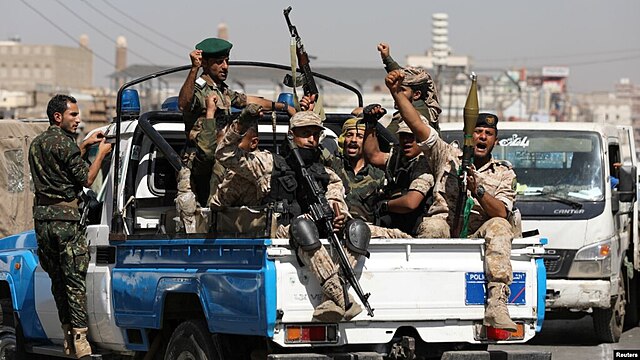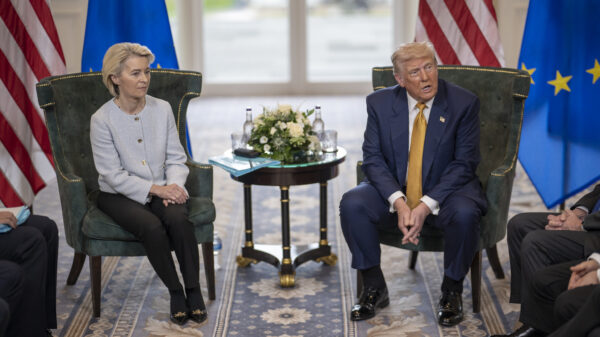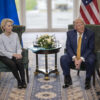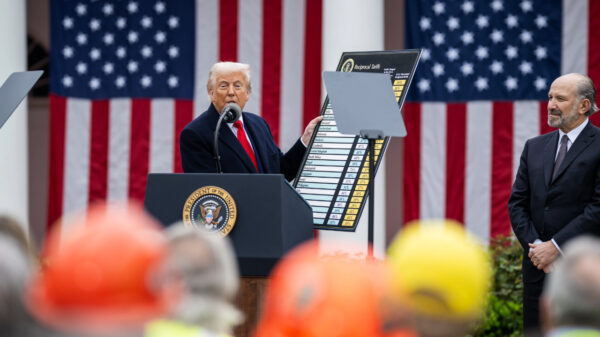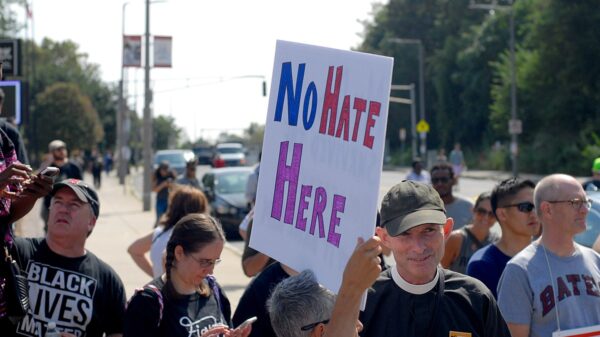Staff writer Salomé Ichay discusses the diplomatic importance of the Houthis’ redesignation as a terrorist organisation.
January 22nd 2025. Donald Trump, 47th president of the United States, redesignated Ansar Allah, commonly known as the Houthis, as a foreign terrorist organisation (FTO). Indeed, under the Biden administration, the label was removed. In this way, the signing of this executive order signals a reconfiguration of US influence in the Middle East and a further strain on an already complex relationship with Iran. Before diving straight into the numerous geopolitical implications of President Trump’s bold move, it would be useful to give a brief overview of who the Houthis are.
Founded in 1992 by Hussein al-Houthi, the Shia Islamist political and military organisation is currently playing a key role in Yemen’s ongoing civil war. Backed by Iran, the militant group has attracted widespread concern for its human rights violations and targeted attacks against civilians both at sea and on land. In this context, the movement has been designated as a terrorist group by several countries, including Canada, Saudi Arabia, the United Arab Emirates and Yemen itself.
The fact that President Trump has decided to reverse the Biden’s administration’s removal of the Houthis from the FTO list is not a merely symbolic decision but may, in fact, lead to a significant reshaping of global power dynamics. However, the question remains: Will Trump’s foreign policy strategy affirm American dominance in the region and favour peace efforts, or will it backfire and cause further instability?
US-Iran Relations in the Context of the Houthis
While the Trump administration justifies this labelling as a necessary step to curb Iranian influence in the region and protect national security, it has led the Houthis to act out through retaliatory attacks on US naval vessels and an aircraft carrier in the Red Sea. In response, the US has launched a series of airstrikes on Houthi infrastructure in Yemen to display military strength in the Middle East.
Labelling the Houthis as an FTO provides a legal framework to justify the US’ decision to engage in an aggressive military campaign against the group. Moreover, while President Trump does have an interest in the militant organisation for security reasons, this label serves as a warning to Iran as the main financial backer of the Houthis. In other words, the goal is to exert “maximum pressure” on Iran by alerting them that any continued support to the Houthis will have dire consequences.
In the long term, this foreign policy strategy aims to limit Iran’s regional influence and eventually undermine its position in any future negotiations (particularly regarding its nuclear weapons and missile programs), as it can no longer rely on its Yemenite proxy.
Red Sea Security: a Balance Between Economic Interests and Countering US Geopolitical Rivals
The Red Sea constitutes a vital commercial waterway for not only the US but also other foreign powers. This is another reason why the Trump administration has such an interest in the Middle East: a crisis in the Red Sea has a direct impact on the transportation of goods between major economies, especially US allies like the United Arab Emirates (UAE) and Saudi Arabia, who rely heavily on a stable access to the maritime oil trade.
According to Intueri Consulting, the Red Sea is responsible for 30% of global container traffic. Furthermore, 15% of global trade goes through the Suez Canal (which then connects to the Red Sea), according to IMF statistics. Since late 2023, the Islamist group has been interfering with ships stationed in the Red Sea to disrupt global shipping. Therefore, maintaining stability in the zone and preserving freedom of navigation is crucial for trading purposes.
Yes, trade is important to the US, but the targeting of Houthis goes beyond economic interests. The series of US airstrikes and the creation of a limited naval coalition should be interpreted as a response to Houthi aggression. This includes not only the targeting of American vessels but also those of Israel, a key strategic ally. The assaults on Israeli ships, in particular, appear intended as a symbolic protest against the ongoing military campaign in Gaza. The game of geopolitical alliances is at its peak. Indeed, ever since Israel has decided to cut off aid deliveries to Gaza, Western, Israeli commercial ships and the territory of Israel have once again been targets of aggressive attacks from the Houthis, leading to a further intensification of US military strikes on Yemen as a response.
The Terrorist Label: A Successful Strategy of Isolation from Negotiations?
The Houthis are disliked not only by the US but also by Saudi Arabia. Since March 2015, a coalition of Gulf states, with Saudi Arabia as the leader and backed by US intelligence support, initiated a campaign of economic isolation and air strikes against the Houthi rebel group.
By officially designating the Houthis as an FTO, the Trump administration is sending a clear message of support to its Gulf allies. More precisely, this redesignation indicates that the US is still committed to maintaining security in the region, including, if required, militarily countering threats posed by Iran under a counterterrorism framework. Furthermore, it also implies that any country working with the Houthis and, by extension, Yemen would weaken its relationship with the US.
Saudi Arabia and UAE are key players in the region and it is in the best interest of the US to keep them close as allies as they are responsible for the overseeing and controlling of energy sources, mainly access to oil markets, in the Middle East.
However, some experts argue that Trump’s bold move will backfire. Ever since this “terrorist” label, tensions have greatly exacerbated between the two sides. Although the initial goal was to weaken the Houthis by isolating them, Trump’s strategy has led to an increase in attacks on ships in the Red Sea – aggravating the economic situation as many companies have decided to take more reliable routes to avoid being potentially caught in a crossfire. Increasing prices.
Furthermore, being listed as a terrorist state may hinder humanitarian aid in a country already experiencing one of the worst humanitarian crises in the world. The more a country suffers, it becomes more likely for extremist groups to exploit this vulnerability to spread a mindset of “nothing to lose”. In short, it corrupts the population to turn to violent means, therefore creating more instability in the region.
In regards to peace-building efforts, the US attempt to undermine the bargaining power of the Houthis can either force them to comply with its demands or lead to a refusal to participate in any kind of negotiations. Finally, the US’s efforts to contain Iran may paradoxically fail as attacking the Houthis is indirectly attacking Iran. The latter may decide to retaliate through its proxy in Lebanon, Hezbollah. However, this scenario seems unlikely since Israel has greatly damaged the terrorist organisation’s structure in the past months.
Looking into the Future
The situation in the Middle East does not appear to get any better. However, it would be unwise to claim that Trump’s manoeuvre is a failure even though it constitutes a high-risk gamble. The situation needs to be monitored over the next couple of months. Who knows? Perhaps things will take a turn, and opposing parties will come to the table to reach an agreement. In the meantime, all we can do is speculate.

